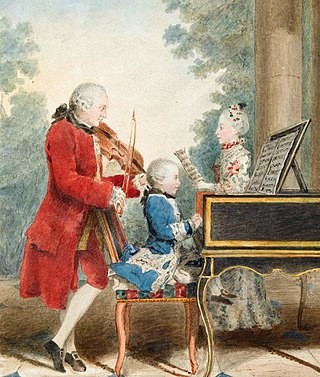Related Research Articles

The Classical period was an era of classical music between roughly 1750 and 1820.

In music, a cadenza is, generically, an improvised or written-out ornamental passage played or sung by a soloist or soloists, usually in a "free" rhythmic style, and often allowing virtuosic display. During this time the accompaniment will rest, or sustain a note or chord. Thus an improvised cadenza is indicated in written notation by a fermata in all parts. A cadenza will usually occur over either the final or penultimate note in a piece, the lead-in, or the final or penultimate note in an important subsection of a piece. It can also be found before a final coda or ritornello.
A concerto is, from the late Baroque era, mostly understood as an instrumental composition, written for one or more soloists accompanied by an orchestra or other ensemble. The typical three-movement structure, a slow movement preceded and followed by fast movements, became a standard from the early 18th century.

Johann Nikolaus Harnoncourt was an Austrian conductor, known for his historically informed performances. He specialized in music of the Baroque period, but later extended his repertoire to include Classical and early Romantic works. Among his best known recordings are those of Bach, whose 193 cantatas he recorded with Gustav Leonhardt.

Trevor David Pinnock is a British harpsichordist and conductor.
A harpsichord concerto is a piece of music for an orchestra with the harpsichord in a solo role. Sometimes these works are played on the modern piano. For a period in the late 18th century, Joseph Haydn and Thomas Arne wrote concertos that could be played interchangeably on harpsichord, fortepiano, and pipe organ.
Sinfonia concertante is an orchestral work, normally in several movements, in which one or more solo instruments contrast with the full orchestra. It emerged as a musical form during the Classical period of Western music from the Baroque concerto grosso. Sinfonia concertante encompasses the symphony and the concerto genres, a concerto in that soloists are on prominent display, and a symphony in that the soloists are nonetheless discernibly a part of the total ensemble and not preeminent. Sinfonia concertante is the ancestor of the double and triple concerti of the Romantic period corresponding approximately to the 19th century.

Robert David Levin is an American classical pianist, musicologist, and composer who served as the artistic director of the Sarasota Music Festival from 2007 to 2017.

Andrew Manze is a British conductor and violinist, noted for his interpretation of Baroque violin music.
The Zurich Chamber Orchestra is a Swiss chamber orchestra based in Zurich. The ZKO's principal concert venue in Zurich is the Tonhalle. The ZKO also performs in Zurich at the Schauspielhaus Zürich, the ZKO-Haus in the Seefeld quarter of the city, and such churches as the Fraumünster and the Kirche St. Peter. The ZKO presents approximately 40 performances in Zurich each year, in addition to approximately 40 children's concerts and performances elsewhere in Switzerland and abroad. In the 2016–2017, season the total number of concerts was151, a record for the ZKO.

Fabio Biondi is an Italian violinist and conductor. He is a specialist in Baroque and early music.

Wolfgang Amadeus Mozart's Horn Concerto No. 4 in E-flat major, K. 495 was completed in 1786.

Ransom Wilson is an American flutist, conductor, and educator.

Martin Pearlman is an American conductor, harpsichordist, composer, and early music specialist. He founded the first permanent Baroque orchestra in North America with Boston Baroque in 1973–74. Many of its original players went on to play in or direct other ensembles in what became a growing field in the American music scene. He later founded the chorus of that ensemble and has been the music director of Boston Baroque from its inception up to the present day.

Sebastian Manz is a German clarinetist. He is solo clarinetist in the SWR Symphonieorchester, international soloist and chamber musician. He is also active as an arranger and composer.
Leonard Hokanson was an American pianist who achieved prominence in Europe as a soloist and chamber musician.

Anthony Newman is an American classical musician. While mostly known as an organist, Newman is also a harpsichordist, pianist, composer, conductor, writer, and teacher. He is a specialist in music of the Baroque period, particularly the works of Johann Sebastian Bach, and has collaborated with such noted musicians as Kathleen Battle, Julius Baker, Itzhak Perlman, Eugenia Zukerman, Jean-Pierre Rampal, Leonard Bernstein, Michala Petri, and Wynton Marsalis, for whom he arranged and conducted In Gabriel’s Garden, the most popular classical record of 1996.
Michael Schneider is a German flautist, recorder player, conductor and academic teacher. He is especially connected with later Baroque repertoire such as the works of Telemann and with early Classical repertoire such as the works of Carl Philipp Emanuel Bach, and founded the orchestra La Stagione to perform and record such repertoire.
Die Kölner Akademie - Damals und Heute is a German baroque and classical music orchestra founded in 1996 and based in Cologne, Germany. It was founded in 1996 by the American conductor Michael Alexander Willens, who studied at the Juilliard School in New York and still leads the orchestra.
Jan Vogler is a German-born classical cellist who lives in New York City.
References
- ↑ www.rdit.co.uk, Red Dragon IT Ltd-. "Halstead Music". halsteadmusic.co.uk.
- ↑ "Michael Rose". Archived from the original on 19 June 2019. Retrieved 14 January 2011.
- Liner notes to Mozart: Horn Concertos and E Major Fragment, Anthony Halstead, natural horn; Hanover Band directed by Roy Goodman. Nimbus Records NI 5104 (1987).
- Liner notes to Johann Christian Bach: Piano Concertos opp. 13, 4–6 & 14, Anthony Halstead, pianoforte and direction; Hanover Band. CPO 999 691–2 (2001).